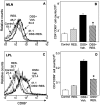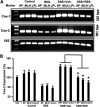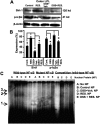Resveratrol (trans-3,5,4'-trihydroxystilbene) induces silent mating type information regulation-1 and down-regulates nuclear transcription factor-kappaB activation to abrogate dextran sulfate sodium-induced colitis
- PMID: 19940103
- PMCID: PMC2835444
- DOI: 10.1124/jpet.109.160838
Resveratrol (trans-3,5,4'-trihydroxystilbene) induces silent mating type information regulation-1 and down-regulates nuclear transcription factor-kappaB activation to abrogate dextran sulfate sodium-induced colitis
Abstract
Inflammatory bowel disease is a chronic, relapsing, and tissue-destructive disease. Resveratrol (3,4,5-trihydroxy-trans-stilbene), a naturally occurring polyphenol that exhibits beneficial pleiotropic health effects, is recognized as one of the most promising natural molecules in the prevention and treatment of chronic inflammatory disease and autoimmune disorders. In the present study, we investigated the effect of resveratrol on dextran sodium sulfate (DSS)-induced colitis in mice and found that it effectively attenuated overall clinical scores as well as various pathological markers of colitis. Resveratrol reversed the colitis-associated decrease in body weight and increased levels of serum amyloid A, tumor necrosis factor-alpha, interleukin (IL-6), and IL-1beta. After resveratrol treatment, the percentage of CD4(+) T cells in mesenteric lymph nodes (MLN) of colitis mice was restored to normal levels, and there was a decrease in these cells in the colon lamina propria (LP). Likewise, the percentages of macrophages in MLN and the LP of mice with colitis were decreased after resveratrol treatment. Resveratrol also suppressed cyclooxygenase-2 (COX-2) expression induced in DSS-exposed mice. Colitis was associated with a decrease in silent mating type information regulation-1 (SIRT1) gene expression and an increase in p-inhibitory kappaB expression and nuclear transcription factor-kappaB (NF-kappaB) activation. Resveratrol treatment of mice with colitis significantly reversed these changes. This study demonstrates for the first time that SIRT1 is involved in colitis, functioning as an inverse regulator of NF-kappaB activation and inflammation. Furthermore, our results indicate that resveratrol may protect against colitis through up-regulation of SIRT1 in immune cells in the colon.
Figures










References
-
- Bhat KP, Pezzuto JM. (2001) Resveratrol exhibits cytostatic and antiestrogenic properties with human endometrial adenocarcinoma (Ishikawa) cells. Cancer Res 61:6137–6144 - PubMed
-
- Birrell MA, McCluskie K, Wong S, Donnelly LE, Barnes PJ, Belvisi MG. (2005) Resveratrol, an extract of red wine, inhibits lipopolysaccharide induced airway neutrophilia and inflammatory mediators through an NF-κB-independent mechanism. FASEB J 19:840–841 - PubMed
-
- Blander G, Guarente L. (2004) The Sir2 family of protein deacetylases. Annu Rev Biochem 73:417–435 - PubMed
-
- Casini-Raggi V, Kam L, Chong YJ, Fiocchi C, Pizarro TT, Cominelli F. (1995) Mucosal imbalance of IL-1 and IL-1 receptor antagonist in inflammatory bowel disease. A novel mechanism of chronic intestinal inflammation. J Immunol 154:2434–2440 - PubMed
Publication types
MeSH terms
Substances
Grants and funding
LinkOut - more resources
Full Text Sources
Other Literature Sources
Research Materials

